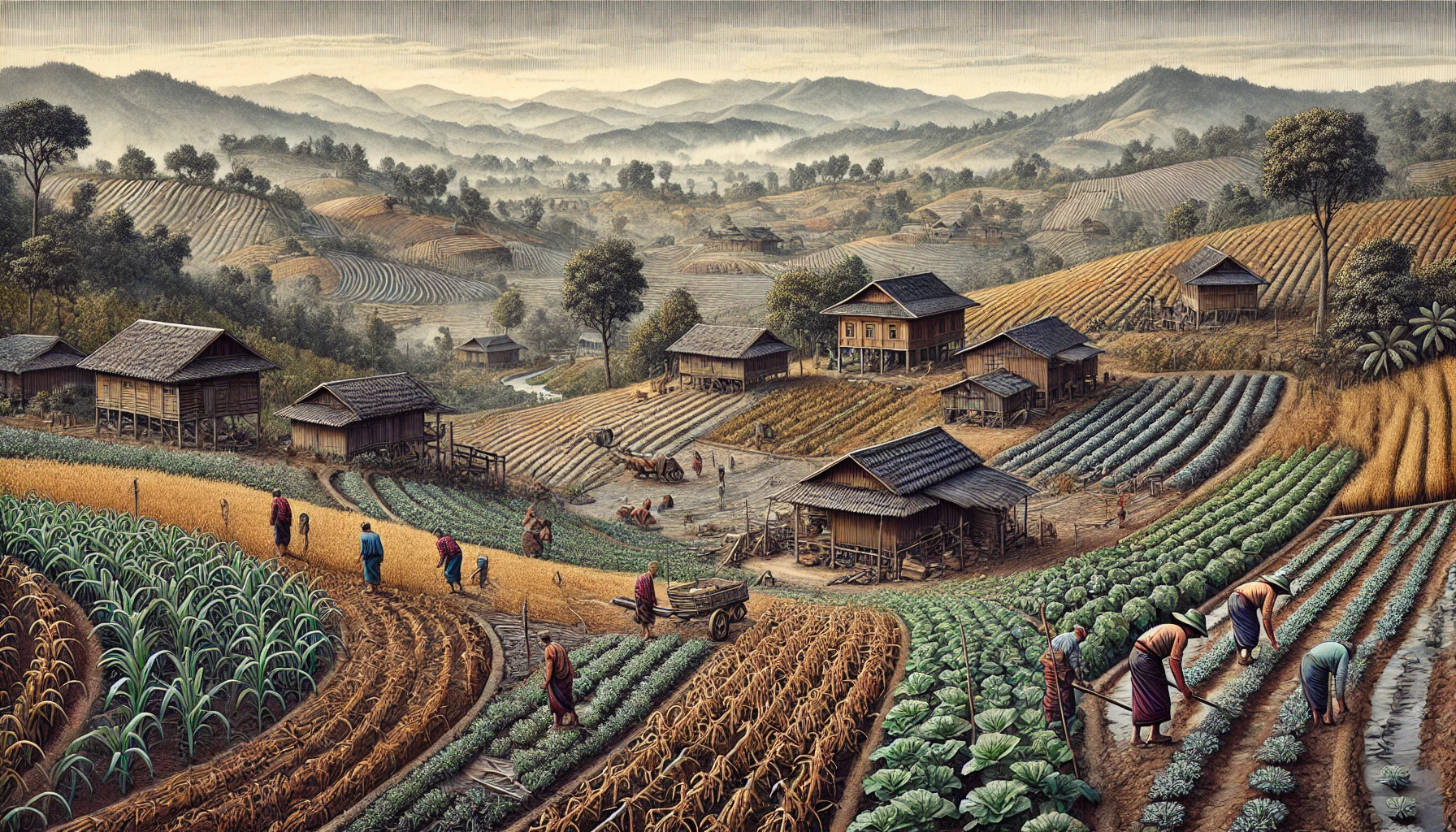Myanmar's Food Crisis: Rising Conflict and Economic Instability Deepen Insecurity
The World Bank's report highlights the severe impact of conflict, economic instability, and logistical challenges on Myanmar's food security, with soaring food prices and declining agricultural trade exacerbating food insecurity, particularly in conflict-affected areas. Urgent international support is needed to sustain agricultural production and improve food access.

The World Bank’s recent report on Myanmar’s food security and agriculture sector, prepared by a team led by Valens Mwumvaneza and Nkulumo Zinyengere with support from various experts, presents a deeply concerning scenario characterized by a combination of conflict, economic instability, and logistical challenges that have significantly affected the livelihoods of farmers and the availability of food across the country.
Plummeting Exports and Skyrocketing Food Prices
The period between 2022 and 2023 saw a noticeable decline in Myanmar’s food exports, which fell by 9%, while imports decreased by 12%. This decline is attributed primarily to the depreciation of the kyat and restrictive policies surrounding export earnings. The resulting economic instability has led to soaring retail food prices, with year-on-year increases ranging between 54% and 78%. This sharp rise in food costs has exacerbated the already precarious situation for Myanmar’s poorest households, particularly in urban areas, where the cost of common and healthy diets has risen by 29% and 37%, respectively. These increases are most pronounced in conflict-affected areas such as Rakhine, Chin, Kayah, and Shan states, where ongoing violence and logistical disruptions have further complicated food access.
Escalating Conflict Worsens Food Insecurity
Food insecurity remains a major issue in Myanmar, with over half of all households reporting a reduction in the consumption of diverse food items by the end of 2023. The report highlights that 30% of surveyed households experienced violence in their villages over the past year, a significant increase from previous years, which has led to widespread displacement and further disruptions in food production and access. This ongoing conflict has not only affected food security but has also had a devastating impact on agricultural production. Although there was a 7% improvement in rice yields between the 2022 and 2023 monsoon seasons, reflecting the resilience of Myanmar's farmers, regional disparities in production outcomes persist. Farmers in insecure regions face significant challenges in accessing essential agricultural inputs, such as fertilizers. While fertilizers became more available in 2023, with a notable reduction in their prices, farmers in conflict zones still struggled to obtain them, highlighting the uneven impact of the country’s broader economic challenges.
Trade Declines Amid Policy and Currency Challenges
In the trade sector, Myanmar’s international food trade in 2023 fell to its lowest level in four years, with rice export volumes declining to levels not seen since 2020. This decline is attributed to the negative effects of government policies on export earnings, the depreciation of the kyat, and difficulties in obtaining import licenses. The resulting strain on the availability of imported food products has further fueled inflation, driving food prices even higher. The depreciation of the kyat, which has been ongoing since the end of 2023, has had a particularly severe impact on imported goods, including essential food items like cooking oil, further contributing to the country’s food insecurity. The report underscores that while rice production continues to surpass domestic consumption, leading to a national surplus, the distribution of this surplus is uneven across the country. States and regions experiencing conflict or logistical challenges face significant difficulties in accessing this surplus, which exacerbates food insecurity in these areas.
Urgent Need for Development Partner Support
The World Bank’s report emphasizes the critical role that development partners can play in mitigating the challenges faced by Myanmar’s vulnerable populations. It calls for increased support to farmers, particularly in conflict-affected and geographically isolated areas, through the provision of essential agricultural inputs such as seeds, machinery, and fertilizers. The report also stresses the importance of enhancing short-term food access, especially in regions most affected by conflict and insecurity. This could involve the provision of emergency food aid, particularly for women and children in conflict zones like Chin, Rakhine, Kachin, and Kayah, where dietary diversity has deteriorated significantly. The World Bank also highlights the need for expanded social protection programs, including maternal and child cash transfers, to support the most vulnerable families. In regions with mobile phone coverage, digital cash transfers have proven effective in supporting vulnerable households and could be scaled up to improve access to cash and food.
A Call to Action for Sustained International Support
Despite the resilience shown by Myanmar's agriculture sector in the face of these challenges, the report makes it clear that the country’s food security situation remains dire. The combination of conflict, economic instability, and logistical disruptions continues to strain the livelihoods of farmers and the availability of food, particularly in rural and conflict-affected areas. The World Bank’s recommendations underscore the need for sustained international support to address these challenges and to help Myanmar's most vulnerable populations navigate the ongoing crisis. The report concludes with a call to action for development partners to continue their efforts in supporting agricultural production and enhancing food security, particularly through targeted interventions in the most affected regions.
- FIRST PUBLISHED IN:
- Devdiscourse
ALSO READ
India Strengthens Ties by Sending Rice Aid to Myanmar
Myanmar's Economic Turmoil: A Nation in Crisis
Arakan Army Tightens Grip: Myanmar's Ethnic Battle for Control
Myanmar’s Economy Faces Severe Setbacks Amid Conflict, Natural Disasters, and Worsening Food Insecurity
Myanmar's Economic Turmoil: A Nation in Crisis










